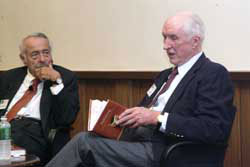BookTalk: A Leap from Mind to Mind
The final program of TC's popular BookTalk lecture series for the 2003-2004 academic year featured Harold Miller, former President and Chairman of publishing house Houghton Mifflin, Inc., discussing his new book, Publishing: A Leap from Mind To Mind.
Miller, a TC alumnus who joined Houghton Mifflin in 1950 as a textbook salesman, was witness to the revolutionary changes that took place over the past five decades in the educational publishing field - some of them, he notes, not for the better. In his book, Miller supplements his own first-hand account by drawing from nearly 100 interviews of people who helped shape 20th century elementary and high school publishing. Beyond the story of how Houghton Mifflin became a major force in education, Miller brings many contemporary issues into focus through the "lens" of his publishing career-the influence of state adoptions, outsourcing, market consolidations, and globalization.
The title Publishing: A Leap from Mind to Mind came from a conversation Miller had with a long-time editor at Houghton Mifflin, when that editor described what she saw as the real work of publishing. During the discussion with moderator Richard Heffner (host of the PBS show The Open Mind), Heffner asked whether the view expressed by that editor could now be considered "an idealistic view, given the transformation that's taken place in the publishing world."
Miller responded by explaining why the current reality of education publishing makes that mind-to-mind communication difficult: "We've watched publishing move from author-centered textbooks written by authorities in the field, towards having a set of anonymous authors. Major states are writing standards, and people are writing to those standards. There is no single author, but a book geared to what a curriculum group in California or Texas will buy," he said. As a result, "the publisher, and the author, have lost out on being leaders in the field. You lose the creativity, that leap from mind to mind. It represents the major shift in textbook publishing over the past half-century," said Miller.
Additionally, the tendency of some publishers to "outsource" the editing of primary school reading and math textbooks - "sending out the 3rd grade series to be edited by one group, and the 5th grade series to another"-can produce a loss in continuity of the series unless there is strong oversight. "Up until the sixth grade, in terms of math and reading skills, someone had to be sitting the driver's seat to see that there is a building of continuity, a sequence of skills," he said.
Market forces have played a strong a hand in reshaping K-12 textbook publishing over the past 50 years. Miller noted that there are only about five publishing houses that produce textbooks for U.S. schoolchildren, "and four of those are owned by foreign conglomerates," compared to more than 100 American publishing houses that thrived in the 1950s. The globalization of the textbook business "bothers me tremendously," he said, adding that from a distant or foreign boardroom, the testing of American children "is just something that a subsidiary company does." Miller retired from Houghton Mifflin as chairman in 1990; the company was sold to French media conglomerate Vivendi in 2001.
Asked about what he saw as the greatest challenge for the textbook publishing world, Miller replied, "It goes back to one central point: the textbook being written by those who created the idea, the expert, and the expertise…that's what's going to have to happen. Our authors found a way to take an idea and find out whether it's teachable-that's what we've lost, and that's what we have to get back."
Published Friday, Jun. 10, 2005
